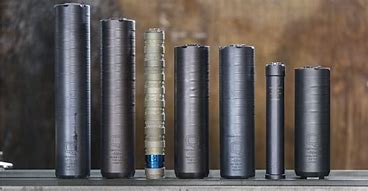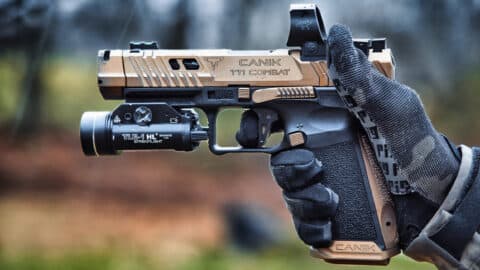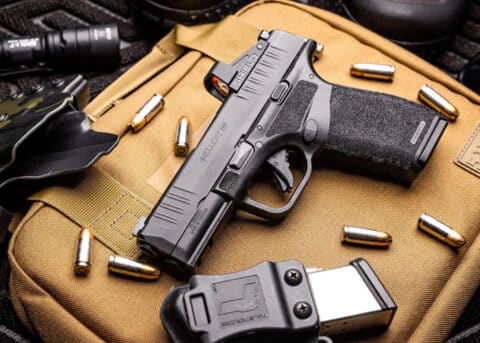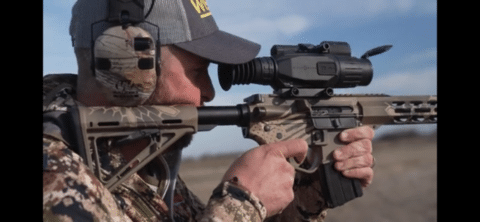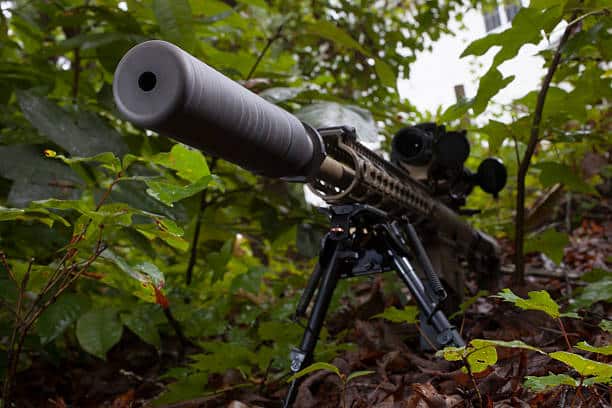
Choosing the right suppressor can feel overwhelming, especially with the wide variety of calibers, thread pitches, and mounting systems available today. Whether you’re running a rimfire pistol, a precision .308 bolt gun, or a short-barreled AR, using the wrong suppressor—or even just the wrong mount—can lead to poor performance or costly damage. In this guide, Suppressor Sizing Made Simple, we break down everything you need to know about suppressor compatibility, from caliber ratings to thread pitch standards and mounting types, so you can make a confident, well-informed choice for your firearm setup.
Chesapeake Gunslingers simplifies the process by giving you the clear, reliable information you need to choose the right suppressor.
SUPPRESSOR CALIBER COMPATIBILITY GUIDE
Suppressors are rated by the largest caliber they can safely handle and are often used across multiple calibers. Here’s how it breaks down:
RIMFIRE SUPPRESSORS
- Compatible Calibers:
- .22 LR
- .22 Short
- .22 WMR (Magnum)
- .17 HMR
- .17 HM2
- Not Compatible With:
- 5.7x28mm (too high pressure)
- Any centerfire cartridge
- Notes:
- Rimfire suppressors are easy to clean but prone to lead fouling.
- Only use with low-pressure rimfire calibers.
5.7x28MM SUPPRESSORS
- Compatible Suppressors:
- Rated rimfire/crossover suppressors like the Rugged Oculus, Dead Air Mask HD, or SilencerCo Switchback (must state 5.7 compatibility)
- Many 9mm and .30 cal suppressors are also 5.7 compatible due to their pressure rating.
- Notes:
- 5.7x28mm operates at centerfire pressures (~50,000 PSI), which exceeds what most rimfire cans are built to handle.
9MM / .380 ACP / .38 SPECIAL / .357 MAGNUM (Pistol Use)
- Compatible Suppressors:
- 9mm-rated pistol suppressors (e.g., Dead Air Ghost-M, SilencerCo Octane 9, Rugged Obsidian 9)
- Also Compatible With:
- .380 ACP
- .38 Super
- Subsonic .300 BLK (in limited cases with fixed barrels)
- .357 Magnum (in limited use if suppressor is rated)
- Notes:
- Tilting-barrel pistols require Nielsen devices (boosters).
- .357 Magnum should be used only in suppressors rated for magnum pressure.
.45 ACP / 10MM AUTO / .40 S&W / .357 SIG
- Compatible Suppressors:
- .45 ACP suppressors (e.g., Rugged Obsidian 45, SilencerCo Osprey 45, Griffin Revolution 45)
- Also Compatible With:
- 10mm Auto
- .40 S&W
- .357 SIG
- 9mm (with piston swap)
- Notes:
- Use appropriate pistons and fixed barrel spacers for different host types.
5.56 NATO / .223 REM / .204 RUGER
- Compatible Suppressors:
- Dedicated 5.56 suppressors (e.g., SureFire SOCOM556, YHM Turbo, Dead Air Sierra 5)
- .30 cal suppressors (with slight reduction in suppression performance)
- Also Compatible With:
- .204 Ruger
- .17 Remington
- .22 Nosler
- Notes:
- Choose a suppressor rated for full-auto or high-pressure use on short-barreled rifles (SBRs).
.300 BLACKOUT (SUBSONIC & SUPERSONIC)
- Compatible Suppressors:
- .30 cal suppressors (e.g., SilencerCo Omega 300, Dead Air Sandman-S)
- Many pistol suppressors for subsonic only (.300 BLK is low pressure when subsonic)
- Notes:
- Use rifle suppressors for supersonic.
- Some pistol cans can handle subsonic use on short barrels with fixed mounts.
.308 WIN / 7.62 NATO / 6.5 CM / 6.8 SPC / .243 WIN
- Compatible Suppressors:
- Full-size .30 cal suppressors
- Examples: Thunder Beast Ultra 7, Rugged Radiant 7.62, SilencerCo Omega 300
- Also Compatible With:
- 5.56 NATO
- .300 Win Mag (if rated)
- 6.5 Grendel / 6.8 SPC
- .243 Win / .260 Rem
- Notes:
- Versatile choice if you want one suppressor across several rifle platforms.
.300 WIN MAG / 7MM REM MAG / .270 WIN / .30-06
- Compatible Suppressors:
- Magnum-rated .30 cal suppressors (e.g., SilencerCo Hybrid 46, Dead Air Nomad L, Griffin Sportsman Ultra Light)
- Notes:
- These calibers produce high pressure and recoil. Only use suppressors explicitly rated for magnum calibers.
.338 LAPUA MAGNUM / .375 CHEYTAC / .416 RIGBY
- Compatible Suppressors:
- Large bore suppressors (.338+ rated), such as:
- SilencerCo Harvester Big Bore
- Thunder Beast 338 Ultra
- Griffin Armament Sportsman 338
- Large bore suppressors (.338+ rated), such as:
- Notes:
- Large bore suppressors are heavier and typically not suitable for multi-caliber use.
???? THREAD PITCHES BY CALIBER
Suppressors attach via threaded barrels. Here’s a rundown of standard thread pitches:
| Caliber / Use Case | Thread Pitch | Platform Examples |
|---|---|---|
| .22 LR / Rimfire | 1/2×28 | Ruger 10/22, Walther P22 |
| 9mm (U.S. pistols) | 1/2×28 | Glock, Sig, CZ |
| 9mm (European pistols) | M13.5×1 LH | HK, Beretta, CZ (EU-threaded) |
| .45 ACP | .578×28 | 1911, FNX-45 Tactical |
| 10mm / .40 S&W | .578×28 | Glock 20/22 (aftermarket barrels) |
| 5.7x28mm | 1/2×28 | FN Five-seveN, Ruger 57, PS90 |
| 5.56 NATO / .223 Rem | 1/2×28 | AR-15, Mini-14 |
| .308 Win / 6.5 CM / .300 BLK | 5/8×24 | AR-10, Remington 700, Tikka T3x |
| .338 Lapua / Magnum | 3/4×24 or M18x1 | Savage 110 BA, Accuracy International |
| AK-47 / 7.62×39 | M14x1 LH | Romanian, Russian, Yugo AKs |
| SCAR 17 / .308 | 5/8×24 (usually) | FN SCAR 17 (some proprietary threads) |
???? SUPPRESSOR MOUNT TYPES
| Mount Type | Description |
|---|---|
| Direct Thread | Simple, cost-effective; screws directly onto barrel threads |
| QD (Quick Detach) | Uses proprietary muzzle device (e.g., KeyMo, ASR, Q Plan B) for fast swaps |
| Booster (Piston) | Found on pistol suppressors; allows function with tilting-barrel handguns |
| Fixed Barrel Spacer | Used on PCCs or subguns to replace booster spring (avoids damage) |
???? TIPS FOR SUPPRESSOR BUYERS
- Pick for pressure, not just caliber: A 5.7x28mm suppressor needs to handle high pressure, even though it’s “small bore.”
- One can to rule them all: A good .30 cal suppressor can handle everything from .223 to .308, and sometimes more.
- Thread adapters work, but check alignment: Improper spacing or threading can cause baffle strikes.
- Don’t use rimfire cans on centerfire guns: Even subsonic .300 BLK is too much pressure for rimfire-only suppressors.
- Check barrel length ratings: Many rifle suppressors have minimum barrel lengths to prevent overpressure and damage.
Choosing the right suppressor can feel overwhelming, especially with the wide variety of calibers, thread pitches, and mounting systems available today. Whether you’re running a rimfire pistol, a precision .308 bolt gun, or a short-barreled AR, using the wrong suppressor—or even just the wrong mount—can lead to poor performance or costly damage. In this guide, Suppressor Sizing Made Simple, we break down everything you need to know about suppressor compatibility, from caliber ratings to thread pitch standards and mounting types, so you can make a confident, well-informed choice for your firearm setup. Chesapeake Gunslingers simplifies the process by giving you the clear, reliable information you need to make the right call.
This guide will get you on your way to shooting a lot more quiet. If you have any questions, reach out to Chesapeake Gunslingers—we’re here to help. Be sure to check out our large selection of suppressors and parts to get started.

